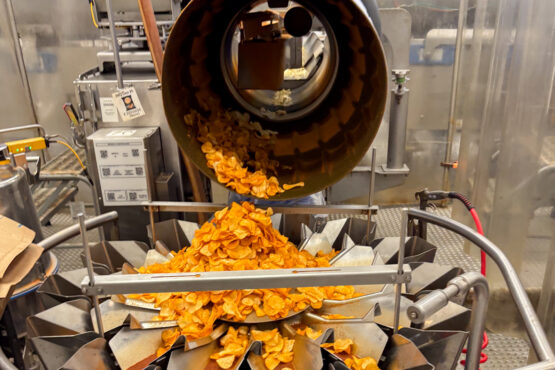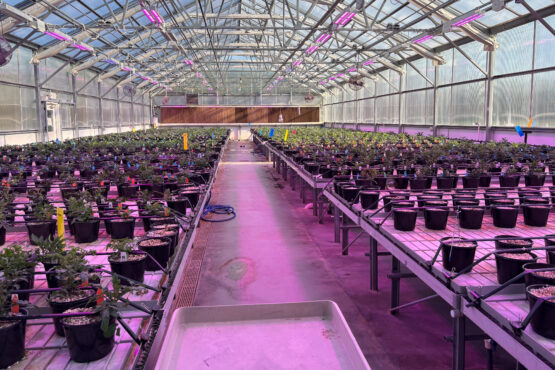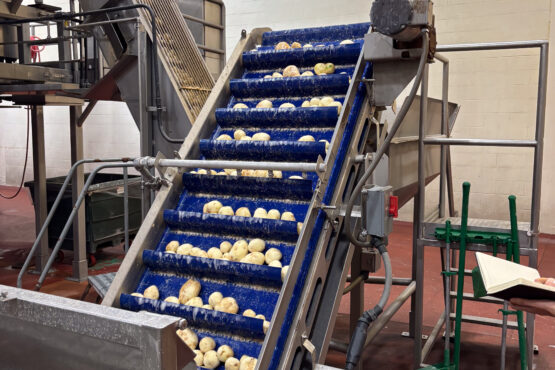PepsiCo Launches Ambitious Initiative to Redesign Lay’s Barbecue Chips
PepsiCo is refreshing its renowned potato chip brand to better reflect consumer desires and adhere to governmental standards.
The snack and beverage powerhouse is now dedicated to utilizing exclusively natural colors and flavors. This initiative entails reformulating six barbecue varieties, including honey, lightly salted, and kettle-cooked mesquite flavors.

PepsiCo’s chip facility in Beloit, Wisconsin. Image: Bloomberg
“Barbecue is among our most beloved flavors,” commented Justin French, a senior director in research and development at PepsiCo. This flavor is second only to classic salted Lay’s chips in sales, making any alterations a delicate matter.
PepsiCo is replacing synthetic dyes with vegetable juices and carob powder in its barbecue-flavored chips. While the flavors were already natural, the impact of the new colorants required careful evaluation. The company asserts that consumers are unlikely to notice any changes in appearance or flavor.
Aligning with a larger industry trend, PepsiCo joins leading food producers in committing to phase out synthetic colors, responding to pressures from Health Secretary Robert F. Kennedy Jr., who links health concerns to artificial ingredients. Although the administration has encouraged the voluntary removal of specific artificial dyes, it has not enforced mandatory regulations. As a result, companies like Walmart Inc and Grupo Bimbo SAB are also phasing out these dyes.
The owner of Gatorade and Tostitos faces additional pressure from activist investor Elliott Investment Management, which has acquired a $4 billion stake in PepsiCo. Last month, Elliott urged PepsiCo to reassess and streamline its snack portfolio, indicating a decline in North American beverage market share and sluggish growth in North American foods.
ADVERTISEMENT
CONTINUE READING BELOW
Despite asserting that most of their products lack these dyes—only about 20% of Lay’s chips utilize them—packaged food companies are intensifying efforts to address the remaining percentage.
This often entails considerable costs, as companies need to perform extensive testing to ensure that new formulations are accepted by consumers. While PepsiCo did not disclose the costs involved in revamping Lay’s, it stated that it has no plans to increase chip prices as a result.
Potato Development
Many Lay’s potatoes are sourced from Rhinelander, Wisconsin, one of PepsiCo’s agricultural facilities focused on breeding potatoes that have low sugar content, white flesh, and a smooth, round shape that is easy to peel.
“They clean very well, as we want to prevent hidden rocks and soil from damaging our slicer blades, which can affect chip texture and ultimately the customer experience,” explained Joshua Parsons, who oversees the breeding facility.

PepsiCo’s agricultural breeding facility in Wisconsin. Image: Bloomberg
This facility features brightly lit areas and a greenhouse housing thousands of pots filled with white-flowered potato plants.
After a multi-year breeding process, these potatoes are cultivated in locations such as Heartland Farms, situated in Hancock, Wisconsin, about two hours south by car, where they are stored in high mounds within cool sheds.
The harvested crops are sent to processing plants, including one in Beloit near the Illinois border. This facility, which converts foil sheets into chip bags, processes around 150 million pounds of PepsiCo products annually, including 40 million pounds of Lay’s chips.
Equipped with specialized machines, the plant removes defective chips, sorts larger chips into bigger bags, and funnels smaller ones into single-serving packages.
ADVERTISEMENT:
CONTINUE READING BELOW
According to PepsiCo, Lay’s commands over a third of the $11.7 billion U.S. potato chip market, making it a crucial brand in the company’s North American foods division. Last quarter, this unit generated nearly $6.5 billion in sales, contributing to almost 30% of the company’s total revenue.

Potatoes being processed in the Beloit facility. Image: Bloomberg
“During these transitions, we dissect the formula into individual elements—colors, flavors, and spices,” stated French.
PepsiCo aims to eliminate synthetic colors and flavors from its entire range of Lay’s potato chips by the end of the year, encompassing baked and kettle-cooked varieties, as well as cheddar cheese-flavored Stax chips, which will utilize paprika for coloring. Furthermore, two Lay’s dips, ranch and French onion, will also convert to all-natural ingredients by early next year.
“Introducing these new components requires a careful balancing act,” French explained in an interview.
As part of the redesign, PepsiCo will launch its chips in new matte bags featuring potato illustrations and an updated logo. The company is also starting to fry its baked Lay’s chips in olive oil, necessitating investments in three facilities, while reduced-fat kettle-cooked sea salt chips will be prepared with avocado oil. Regular Lay’s chips will continue to be cooked in vegetable oil for cost-effectiveness. Additionally, Lay’s plans to unveil two new baked flavors in January: loaded baked potato and roasted potato with herbs.
French emphasized that PepsiCo’s drive for these changes stems from shifting consumer preferences and the anticipation of future regulatory developments.
© 2025 Bloomberg
Follow Moneyweb’s extensive finance and business news on WhatsApp here.

